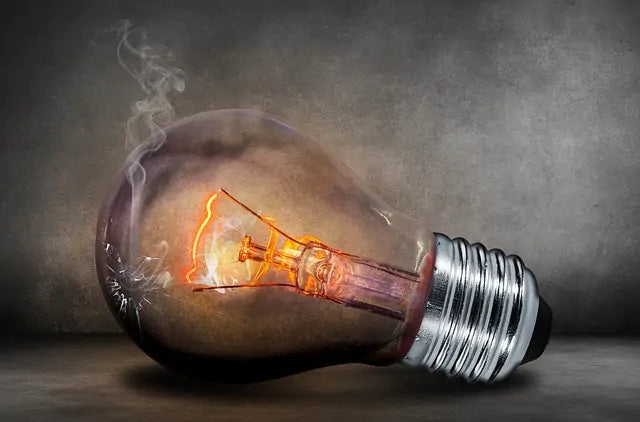Your basket is currently empty.
Shop NowHow To Recycle Light Bulbs

When it comes to recycling, light bulbs are often high up on the ‘how on earth do I recycle this?’ list. Disposing of light bulbs properly is all in the type of light bulb. Some you can recycle and some you can not. Here’s our ultimate guide on how to recycle light bulbs.
Why Recycle Light Bulbs?
You’ve got some light bulbs to dispose of. So what do you do? Go to the household waste bin and chuck them in. Consider recycling them but lose your nerve? Or do you put them in that drawer, where the used batteries go to die? Before you do anything, you need to think about what type of light bulbs you’ve got.
You can only dispose of incandescent and halogen bulbs with your household waste. This is because they do not contain any harmful chemicals or components that require special processing. You need to recycle other bulbs, like fluorescent lamps and some LEDs properly.
How to Recycle Light Bulbs
Incandescent light bulbs
These are those old-school light bulbs you might still have in a table lamp. You can also find them in torches and car headlights.
You can’t recycle these because they contain wires that are hard to separate from the glass. Put these bulbs in with your household waste. Wrap them up in newspaper or put them in a box incase they break and injure refuse workers.
Halogen bulbs
You might have halogen bulbs in your car or as underlighting for your kitchen cabinets. You can’t recycle light bulbs like this either. They need to go in your household waste bin. As with incandescent bulbs, wrap them up before you throw them away in case they break.
Fluorescent and Compact Fluorescent (CFL) Bulbs
We all know fluorescent lights. From the office to retail stores and warehouses, they have that particular glow. Compact fluorescent bulbs look like a spiral and are often used in swanky modern lamps.
Both fluorescent and compact fluorescent bulbs are classed as hazardous waste. This is because they contain hazardous substances like mercury, lead, and cadmium. If you put these bulbs in with your household waste, it could be harmful to the environment as well as refuse workers. If they break, they can release harmful substances into the air or groundwater.
It’s best to recycle these types of bulbs for safety reasons and to preserve valuable resources like glass and metals. Take them to a household recycling centre with the facilities to recycle them properly according to the WEEE (Waste Electrical and Electronic Equipment) regulations.
LED light bulbs
With the phasing out of old inefficient light bulbs, LED light bulbs have become popular in homes, vehicles, workplaces, and more. You can throw LED bulbs away in your household rubbish. However, it is best practice to recycle them and conserve the precious metals and glass they’re made of.
Where Can You Recycle Light Bulbs?
If want to recycle light bulbs and you’ve checked that they’re definitely recyclable, you can:
Take them to a household recycling centre. Recycle them at a Recolight collection point. Recolight is an organisation that will collect commercial or domestic light bulbs for free. They have a network of collection points at household recycling centres, some council offices, and some branches of Robert Dyas, Tesco, and Sainsbury’s. Find your nearest collection point here.
The Benefits of Recycling Light Bulbs
When it comes to recycling light bulbs, think before you throw. Recycling light bulbs:
Keeps Hazardous Waste Out of the Environment
Recycling light bulbs properly prevents the release of hazardous substances like mercury, lead, and cadmium into the environment.
Prevents More Waste From Going to Landfill
If light bulbs are sent to landfills, there’s a risk that hazardous materials will seep into the soil and groundwater, causing pollution. We also lose lots of precious resources. This brings us nicely to our next point.
Preserves Precious Resources
Glass and metals in light bulbs are renewable resources. If you recycle light bulbs, this means new items can be made from recovered materials. This is far kinder to the environment than mining for new materials.
Recycling Light Bulbs - The European League Table
So how are we doing with light bulb recycling in the UK? Well if it was the Olympics, we’d have the silver medal. Yes, we are second only to Germany in the league table. Here’s a quick snapshot of the top 5 light bulb recyclers in Europe.
| Country | Tonnes |
| Germany | 7,552 |
| UK | 6,368 |
| France | 4,780 |
| Italy | 2,502 |
| Spain | 2,420 |
Interesting Facts About Light bulbs
We thought it would be good to round off our guide on how to recycle light bulbs with a little bit of light bulb trivia. Whether they come in handy for you as a savvy homeowner or in a pub quiz, knowledge is power.
Did you know?:
- In most homes, lighting makes up 10-15% of your electricity bill;
- Using an energy-efficient light bulb saves you about £9 per year compared to a 100W bulb;
- If you leave on a 100W light bulb for just half an hour, it creates enough carbon dioxide to fill a balloon.
Want more interesting articles and facts on recycling and sustainability? Check out the rest of our blog.
